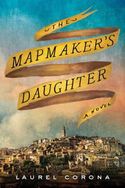
 The people of medieval Europe sometimes seem as if they are from another planet, their world view is so radically different from our own. How could people have had such blind faith, asked so few questions, expected so little of life, been satisfied with only the hope of heaven?
The people of medieval Europe sometimes seem as if they are from another planet, their world view is so radically different from our own. How could people have had such blind faith, asked so few questions, expected so little of life, been satisfied with only the hope of heaven?
It’s hard to imagine writing a compelling story populated only by docile, unimaginative people, and I am happy to report it is completely unnecessary to try. However valid the above generalizations may be, there was enough independence of thought and action in the Middle Ages to provide fertile ground for historical novelists.
Vicki Leon has done a great service by compiling hundreds of profiles of “Uppity Women” for her series by that name. Although the protagonist of my new novel, THE MAPMAKER’S DAUGHTER (Sourcebooks, March 2014) is not one of Leon’s heroines because she is my invention, knowing that such women existed gave me a greater degree of license to create a woman who was doing more than stereotypical things like cooking gruel, making crone-like remarks, darning old socks, and dying in childbirth.
Jewish matriarch Amalia Cresques makes many courageous choices during the course of her long life, decisions she recounts in the novel while waiting for the ship that will take her into exile after Ferdinand and Isabella’s 1492 decree expelling all the Jews from Spain. These decisions include engaging in a long and passionate affair with a Muslim man, a development I imagine is likely to raise questions among readers about its plausibility.
Readers of historical fiction sometime comment that the heroines seem “too modern.” They say, think, and do things that don’t seem likely within the constraints of their times. I can’t speak for every novel, but I can say emphatically that before I write anything questionable I have done my research, and nothing happens in my novels that was not possible in its time. Nothing in Muslim or Jewish law prohibited a relationship between Jamil (a Muslim) and Amalia (a Jew). Though eyebrows would undoubtedly be raised within the Jewish community, Amalia’s specific circumstances (sorry, no spoilers!) make her decision entirely within the realm of possibility.
Women deny our real history when we buy into the idea that our lives, until recently, were inevitably nasty, brutish and short. We should believe in our long buried sisters more than that.
Amalia and Jamil are soul mates, and we all know we don’t choose who to love. They foster the poetry and passion in each other, and of course, as in all relationships, the pain as well. I wanted to write a great love story, but more than that I wanted to portray the hope and potential that comes from being open to life, and not ruling out what will bring us fulfillment because others may disapprove. Perhaps most of all, I want to believe there were many Amalias doing just that among the forgotten women of history. My novels are written to honor them.
About Laurel Corona
Laurel Corona is the author of three historical novels, including FINDING EMILIE (Gallery Books, 2011), which won the 2012 Theodore S. Geisel Award for Book of the Year, San Diego Book Awards. She has taught at San Diego State University, the University of California at San Diego, and San Diego City College, where she is a professor of English and Humanities.
Corona is a member of the Brandeis National Committee, the National Council of Jewish Women, and Hadassah. She has written over a dozen nonfiction Young Adult books for school library programs, primarily on Jewish topics. She lives in San Diego. Website
Two commenters will win a copy of THE MAPMAKER’S DAUGHTER
About THE MAPMAKER’S DAUGHTER
A sweeping novel of 15th-century Spain explores the forgotten women of the Spanish Inquisition
In 1492, Amalia Riba sits in an empty room, waiting for soldiers to take her away. A converso forced to hide her religion from the outside world, She is the last in a long line of Jewish mapmakers, whose services to the court were so valuable that their religion had been tolerated by Muslims and Christians alike.
But times have changed. When King Ferdinand and Queen Isabella conquer Granada, the last holdout of Muslim rule in Spain, they issue an order expelling all Jews who refused to convert to Christianity. As Amalia looks back on her eventful life, we witness history in the making—the bustling court of Henry the Navigator, great discoveries in science and art, the fall of Muslim Granada, the horrors of the Spanish Inquisition. And we watch as Amalia decides whether to relinquish what’s left of her true self, or risk her life preserving it.
Exploring an under-published period in history, The Mapmaker’s Daughter is a sweeping saga of faith, family and identity that shows how the past shapes our map of life.
To comment on Laurel Corona’s blog please click here.


No Comments
Comments are closed.